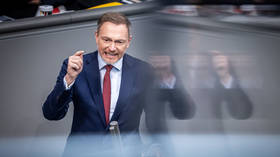Germany ‘getting poorer’ – finance minister

Germany’s inability to generate economic growth is making the country poorer, Finance Minister Christian Lindner said on Monday while speaking at a Bloomberg event in Frankfurt.
A prolonged period of little or no expansion is inevitably having consequences for the EU’s economic behemoth, according to Lindner, who also leads the country’s Free Democratic Party.
“We are no longer competitive,” Linder said. “We are getting poorer because we have no growth. We are falling behind.”
His comments come shortly after the Organisation for Economic Cooperation and Development (OECD) published a gloomy outlook in which it slashed by half its forecast for German growth this year to only 0.3%, well below the 2.9% it anticipates for the G20 and even below the 0.6% it projects for the Eurozone.
Meanwhile, the industrial production data that will be released later this week is expected to come in at its lowest level since 2008, when German industry was heavily impacted by the aftermath of the global financial crisis.
“It is inconceivable to me that the government does not draw any conclusions from this analysis,” Linder said.
He stressed that it was quite clear that all of Germany’s social obligations, including “the status quo of social security,” environmental projects, and the necessity of increasing spending on the country’s external security “can only be realized with more economic prosperity, not otherwise.”
Official preliminary data released in January by Destatis shows price-adjusted GDP having dropped by 0.3% last year. Meanwhile, industrial output (excluding construction) contracted by 2%, a result primarily attributable to much lower production in the energy supply sector.
For more stories on economy & finance visit RT's business section












